Washington Township fights for independence from Ames — a movement dating to 1985
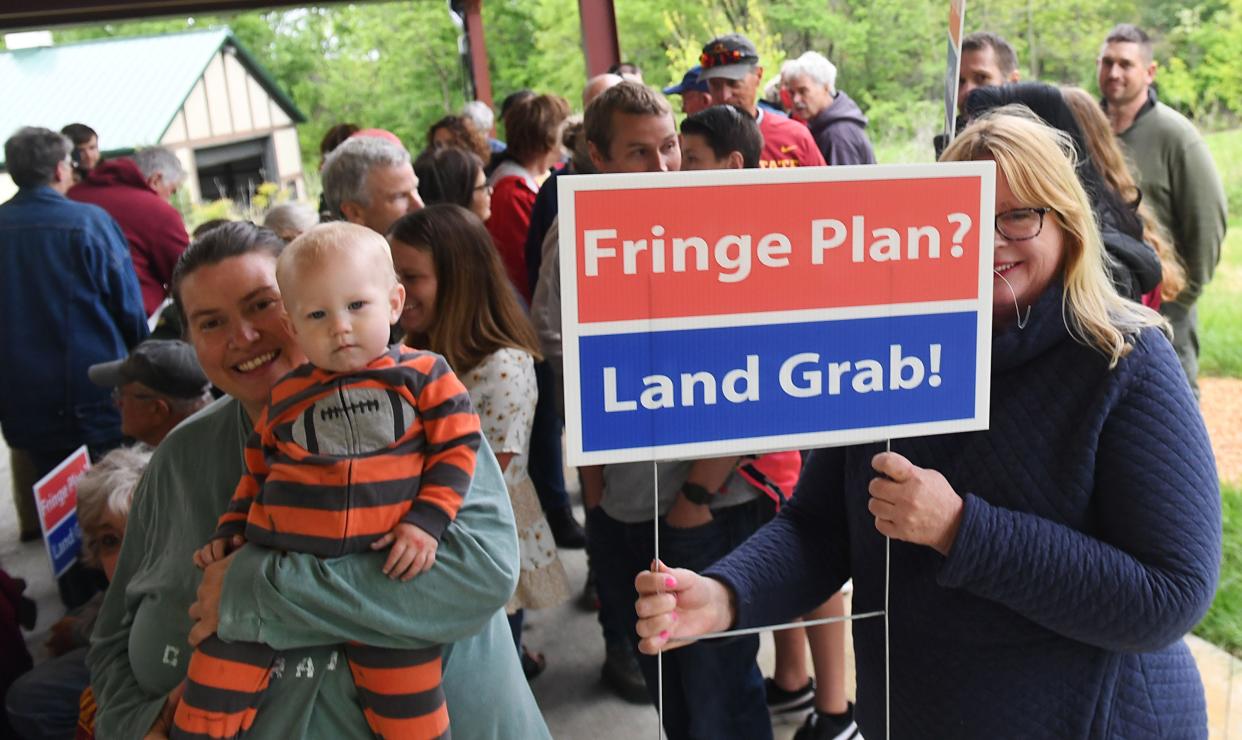
"Urban Fringe? Land Grab!"
In yards in the rural fringe of Ames, these signs signify a movement in neighborhoods mainly southwest of Ames — a tradition of property rights fights that dates to 1985. Ames, Gilbert and Story County are in the process of drafting an updated Urban Fringe Plan, an agreement between the municipalities as the cities look to grow beyond their borders.
Ames and Story County say the plan is important to plan for the future growth of Ames as available land in the city is limited, but opponents fear it gives too much power to Ames and puts their rural way of life at risk.
More: 'We were at an impasse': Ames' rural water agreement could end statewide development hurdle
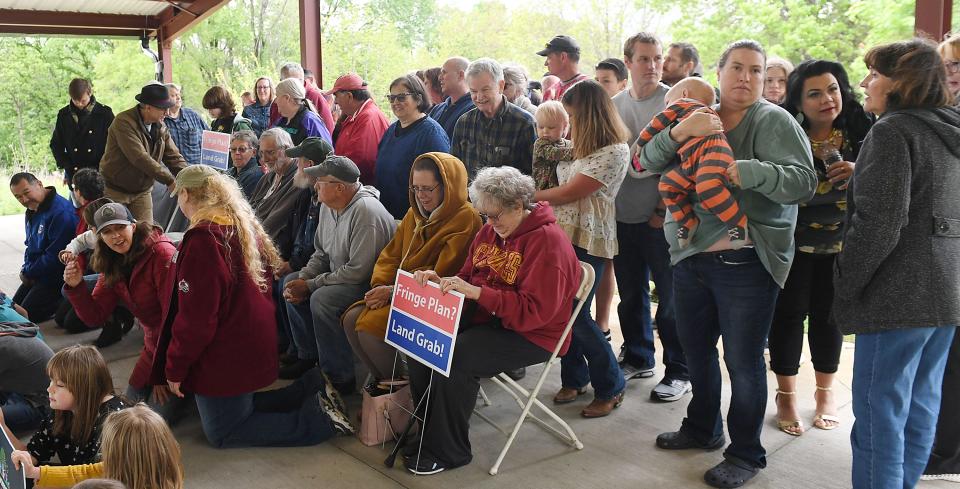
"They have control already, but they want much, much more," Washington Township Trustee Kim Christiansen said. "They're wanting us to give our rights away. It's a concert of the city planner and the county planner working very closely."
A packed Ames Library Auditorium was tense May 23 as Story County Planning and Development Director Amelia Schoeneman and Ames Housing and Planning Director Kelly Diekmann sat before the group of landowners.
When that meeting convened, not all property owners had received postcards from the city notifying them it was even happening. The plan draft is in the midst of the public input portion, and a final draft is expected to be approved before the end of the summer.
The main opposition came from the people southwest of Ames, a group that found the nonprofit WORLE, Washington Owners for Rural Land Enhancement. Named after the creek, also known as Worle Creek, considered the gem of their rural environment.
Each board member of WORLE has their own thick collection of documents relating to land, city and county zoning laws and each past attempt at annexation. Keeping up with the Ames fringe is practically a full-time job for them.
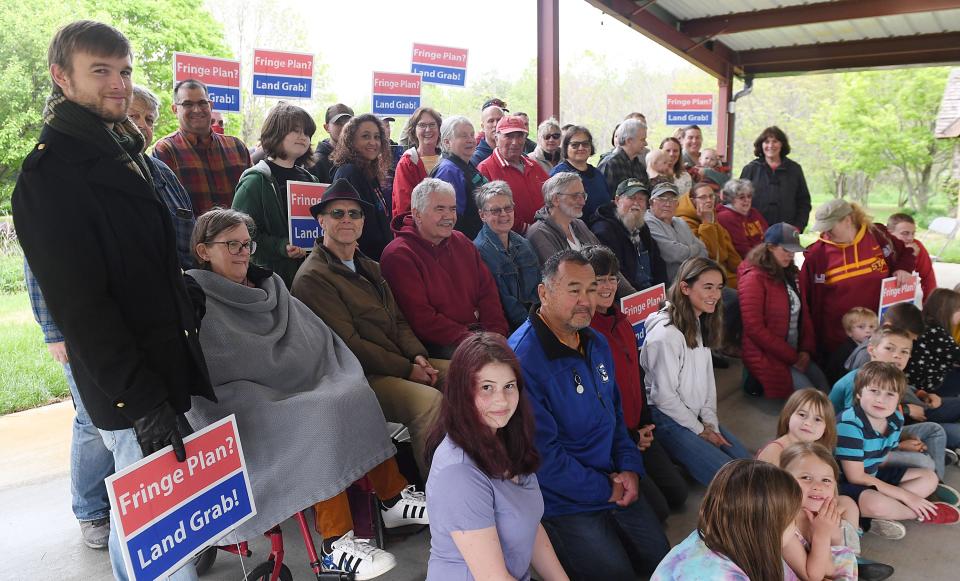
Not all neighbors are impacted in the same way by the Urban Fringe Plan Draft. Some fall in Urban Growth, areas where growth can be supported and "is desirable in the short term," according to the plan.
Others fall in the Urban Reserve Overlay, areas where municipal services can feasibly be extended in the long-term and come with suggested restrictions for conditional-use permits — including bed and breakfasts and campgrounds — to keep the area ready for Ames development.
The southwest area was the main focus of city growth decades ago, but residents argue the area is among the most impractical places for development and push for exclusion from the urban reserve plan. But the city sees the area differently.
"This is an area you absolutely should reserve," Diekmann said at a February 2020 council meeting. "It's very practical to develop. You have an interchange and a water tower out there to support its development.
"Why would we walk away from that?"
When it comes to threat of annexation, the southwest has history

"I might as well die now," Christine Hausner's father said upon hearing the Champlin Farm was for sale after 100 years.
Hausner hopes her son will be the fifth generation of her family to live on the land, particularly the portion given to her grandfather by the Champlin family. Her parents live on the parcel now.
Previous: Ames woman is using GoFundMe to protect Worle Creek
Before her grandfather, her great-grandfather worked and lived on the farm. She sees her childhood reflected in her son, catching tadpoles in Worle Creek and exploring the lush greenery surrounding it.
Though the sale of the Champlin Farm ultimately did not end in annexation, it was one of many fights to hold on to their rural lifestyle.
A binder saved by her mother holds all the mementos from 1985 when 21 families dedicated $100 each to hire a lawyer to represent them as a new subdivision was planned, an apparent low-density equestrian paradise, according to Tribune archives.
The Tribune reported residents were enthusiastic about the low-density plans, but Hausner's records show opposition to requirements to use city water and sewer.
As the city does not pursue involuntary annexation, the cost of connecting to city water and sewer falls to land owners. Diekmann said residents can use their septic tanks until they are no longer serviceable, then would be required to connect to city services.
By pursuing an 80-20 voluntary annexation, the 20% in opposition will still need to front infrastructure costs.
Brad Perkins, an engineering professor at Iowa State, and his wife Gina opened Raspberry Hill, a scenic Bed & Breakfast southwest of Ames. He argued at a May 23 open forum the Urban Fringe Plan and their inclusion in the Urban Growth overlay is the latest hit to their business — and losing Raspberry Hill isn't all that's at stake.
The couple opened Cultivating Hope Farms in 2020 on the same property, a care farm that helps build life and job skills for children like their 5-year-old daughter Kaitlyn, who is diagnosed with autism.
If ever annexed, Perkins said the cost to connect to city infrastructure surpasses $1 million. His property was already identified as Tier 2 growth in the 2040 Plan, the second priority area. Being a new business, this would not be a cost they can take on.
The Urban Fringe Plan does not indicate when annexation will occur, if ever. Opponents often say the growth area is nearly as big at the 17,000 acres currently within Ames' borders.
Diekmann said he is trying to be transparent by including so much land. The city can use current infrastructure to identify the most easily developable land but cannot predict where developer interest will be and when.
The area identified in the plan could go undeveloped for a century while other areas could be annexed within years.
A February 2020 meeting on the most recent annexation attempt felt like a win to WORLE and left many under the impression the southwest area wasn't to be included in the 2040 Plan. But when the plan was approved, it was.
While areas east of South Dakota Avenue are not included in the tier map — priority growth areas for the city — they are listed as residential established and residential expansion in the full map.
Even if an area in the fringe is not deemed a priority area, these areas are not safe from annexation, as long as their development does not undermine current growth areas, per the 2040 Plan.
While neighbors fight against the urban reserve overlay, the 2040 Plan already lists them as urban reserve on another map in the plan. At the February 2020 meeting, the council voted to keep growth focused north of Highway 30.
At that meeting, Mayor John Haila said he did not want people to have false expectations this vote meant safety from annexation.
“I really don’t want to be up here, but I don’t really have a choice. Nobody knows about this property more than I do,” Hausner said during the January 2020 meeting. “We are the ones who have to live with your decision. It’s a beautiful and unique area and it’s worth fighting for.
“I’m literally this close to handcuffing myself to a tree. Please don’t make me handcuff myself to a tree.”
Rural life is not compatible with annexation, opponents say
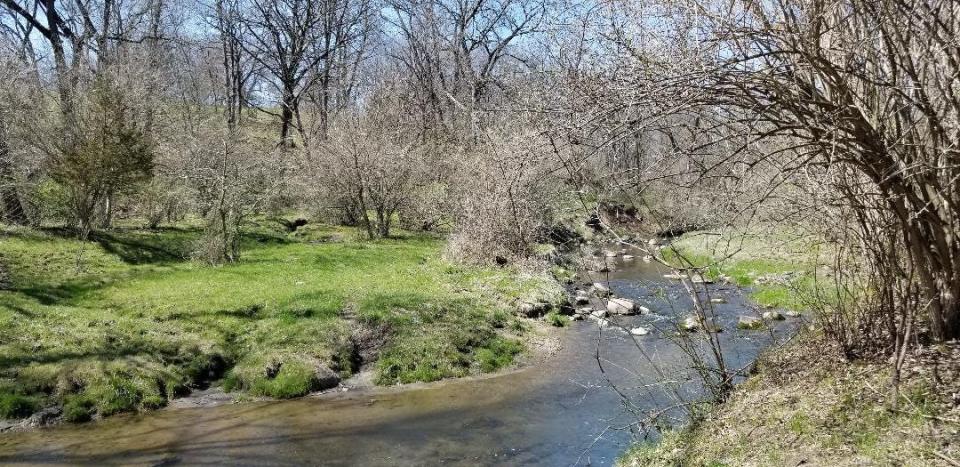
The day trees felled along Ioway Creek left a stark gap to onlookers driving along Duff Avenue, the city lost a bit of trust from residents. For Iowa State ecologists, their reaction was visceral and the long-term impacts appeared substantial.
For subscribers: 'Like a gut punch': Iowa State professors raise issue with trees felled for flood mitigation
But for the city, after historic flooding, the safety the flood mitigation project offered outweighed preservation. Still, WORLE advocates like Hausner worry they'll see the same impacts if more infrastructure is built in their area.
The Big Bluestem Audubon Society wrote a letter condemning any development plans near Worle Creek.
"Professors from ISU and other conservation professionals have reported concerns about potential damages to nature here, such as threatened or endangered species of plants, birds and other wildlife, while clearing forest and lowering water quality of Worrell Creek," the letter reads.
The letter claims the city plans to straighten the creek, but Diekmann said these claims are unfounded as that is a method for flood mitigation and would not be necessary to put in infrastructure.
Hausner claims the current infrastructure in the area already caused impacts to Worle Creek, such as landslides and erosion on the hills. The area lost a number of oak and walnut trees at the time as well. She often sites a 2005 environmental study of the creek and surrounding environment that called for the area to be "highly conserved."
"If we do projects, we are going to be doing environmental assessments, we'll understand what measures we can take to reduce or mitigate impacts," Diekmann said. "It's not just we're coming in and clear-cutting everything."
Those who live in the southwest area say the environment is not conducive to development aside from environmental sensitivity, with rolling hills gridlocked by private Iowa State property. Iowa State is uninterested in ever selling its property south of Ames, Diekmann said.
Even if development is placed in the area, Hausner said those unaccustomed to rural life will be bothered by the sounds and smells of livestock in the area. For these reasons, WORLE believes they should be left out of future land-use plans.
The Audubon letter was not the only one in opposition to the plan. The Washington Township also sent a letter, dismayed over how further growth may shrink them into nonexistence.
Christiansen said they are down to half their original acreage and one area designated as urban growth, the Meadowglen neighborhood, provides the majority of its tax base.
"I know as a Washington Township trustee, we are at the lowest totem pole politically," Christiansen said at a WORLE meeting.
The main concern for trustees and Washington residents is the money annexation could take from the Kelley Fire Department. They argue that without city water infrastructure readily available, tanker trucks are needed to fight rural fires, a resource Ames fire does not have.
Diekmann said while Ames fire has enough water on its trucks to fight smaller fires in the area, the Kelley Fire Department can always be called on to assist.
"We believe very strongly in Ames Fire's ability to respond to emergency medical calls faster than anyone else," Diekmann said. " And there's mutual aid calls, obviously, whenever they're necessary."
But Christiansen said this does not make up for the lost financial support to Kelley Fire. Diekmann said there are no plans for the city to financially assist the Kelley Fire Department.
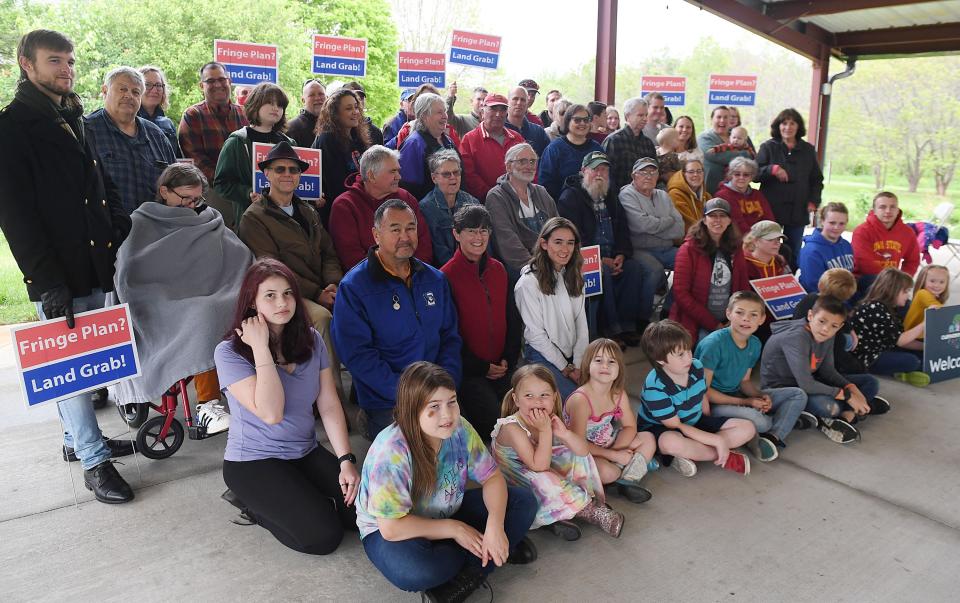
'They're gonna do what they want'
For many opposing the Urban Fringe Plan, they fear the statutes are more about Ames control than necessity.
Perkins has voiced at meetings his opposition to the listed incompatible conditional use permits, which accommodate additional land uses.
Conditional uses deemed incompatible for the urban reserve overlay include campgrounds and RV parks and bed and breakfasts. As his business would be grandfathered in (Perkins joked that this would be a way to ensure no competition), he takes issue with the county giving this much control to the city for property unlikely to be annexed for decades.
Diekmann said the conditional uses would still fall to county authority, and the Urban Reserve Plan gives considerations when the county makes these decisions.
Any plans to annex are not to claim a tax base, Diekmann said, but to accommodate growth. He estimates Ames has five to seven years of developable land left before it will need to grow outside its borders.

By 2040, Ames could be nearing 80,000 people, nearly 15,000 more than today.
For some neighborhoods, being identified as urban growth is not to increase the density of their area but to signal easy annexation if they end up in between the city's boundary and new development. State code does not allow islands of unincorporated land to exist, aside from those grandfathered in.
Many took issue with other ways planning and zoning dictates how they can use their land, such as how many homes can be built on one parcel or how they can split their lots, but Diekmann and Schoeneman say these restrictions already exist.
Without the Urban Fringe Plan, Ames would still have review authority over land within two miles of its border per state law.
People argue the county is giving too much power to the city of Ames, but Schoeneman said without the plan, the county would have no authority on annexations within the urban fringe.
"I think the fringe plan gives the county an important tool in terms of annexations," Schoeneman said.
The county will hold another open house 4 p.m. to 6 p.m. Tuesday at the City Church, 2400 Oakwood Rd. Despite the chance to give input, the years of fights have left Hausner disillusioned by the whole process.
“Outreach, I personally think doesn't work because we've been doing that and it makes you feel good because you feel like you're being heard,” Hausner said. “But in the end, I don't think it will matter because I don't think they'll listen to anything anybody says. They're gonna do what they want anyway.”
The draft Urban Fridge Plan and a form to give public comment can be found at www.storycountyiowa.gov/1243/Ames-Urban-Fringe-Plan.
Danielle Gehr is a politics and government reporter for the Ames Tribune. She can be reached by email at dgehr@gannett.com, phone at (515) 663-6925 or on Twitter at @Dani_Gehr.
This article originally appeared on Ames Tribune: Rural residents oppose Ames Urban Fringe Plan, future annexation

